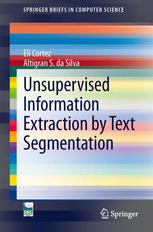

Most ebook files are in PDF format, so you can easily read them using various software such as Foxit Reader or directly on the Google Chrome browser.
Some ebook files are released by publishers in other formats such as .awz, .mobi, .epub, .fb2, etc. You may need to install specific software to read these formats on mobile/PC, such as Calibre.
Please read the tutorial at this link: https://ebookbell.com/faq
We offer FREE conversion to the popular formats you request; however, this may take some time. Therefore, right after payment, please email us, and we will try to provide the service as quickly as possible.
For some exceptional file formats or broken links (if any), please refrain from opening any disputes. Instead, email us first, and we will try to assist within a maximum of 6 hours.
EbookBell Team

5.0
28 reviewsA new unsupervised approach to the problem of Information Extraction by Text Segmentation (IETS) is proposed, implemented and evaluated herein. The authors’ approach relies on information available on pre-existing data to learn how to associate segments in the input string with attributes of a given domain relying on a very effective set of content-based features. The effectiveness of the content-based features is also exploited to directly learn from test data structure-based features, with no previous human-driven training, a feature unique to the presented approach. Based on the approach, a number of results are produced to address the IETS problem in an unsupervised fashion. In particular, the authors develop, implement and evaluate distinct IETS methods, namely ONDUX, JUDIE and iForm.
ONDUX (On Demand Unsupervised Information Extraction) is an unsupervised probabilistic approach for IETS that relies on content-based features to bootstrap the learning of structure-based features. JUDIE (Joint Unsupervised Structure Discovery and Information Extraction) aims at automatically extracting several semi-structured data records in the form of continuous text and having no explicit delimiters between them. In comparison with other IETS methods, including ONDUX, JUDIE faces a task considerably harder that is, extracting information while simultaneously uncovering the underlying structure of the implicit records containing it. iForm applies the authors’ approach to the task of Web form filling. It aims at extracting segments from a data-rich text given as input and associating these segments with fields from a target Web form.
All of these methods were evaluated considering different experimental datasets, which are used to perform a large set of experiments in order to validate the presented approach and methods. These experiments indicate that the proposed approach yields high quality results when compared to state-of-the-art approaches and that it is able to properly support IETS methods in a number of real applications. The findings will prove valuable to practitioners in helping them to understand the current state-of-the-art in unsupervised information extraction techniques, as well as to graduate and undergraduate students of web data management.